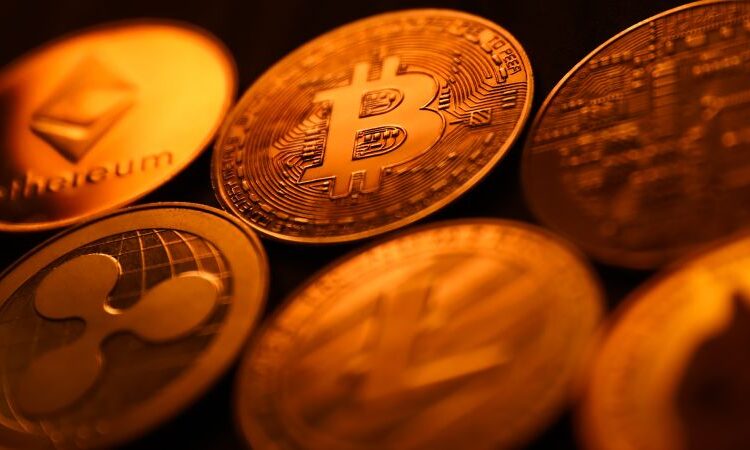
New York
CNN
—
Crypto’s 14th year in existence was one marred by scandal, bankruptcy, fraud and regulatory squabbling. It still may have been the industry’s best year ever.
The cast of “Crypto 2023” starred figures that are now practically synonymous with fraud: Sam Bankman-Fried, Changpeng Zhao, Alex Mashinsky, and, less prominently, Heather “Razzlekhan” Morgan and Ilya Lichtenstein (aka ‘Bitcoin Bonnie and Clyde’).
Despite all the bad press, the young industry notched some notable wins.
Bitcoin, the crypto’s bellwether asset, is up 160% for the year. Two high-profile court cases came down in the industry’s favor. And a long-awaited approval for a mainstream investment product is expected in January, potentially flooding the scene with new investors.
Like the rest of the financial world, digital assets got a boost from an improving macroeconomic picture in cooling inflation, a growing economy, and a long-awaited end in sight for the Fed’s interest rate hikes.
“It was the year of crypto’s resiliency,” Kyla Curley, a crypto expert and partner at global advisory StoneTurn, tells CNN.
One big component of that resiliency is how US authorities, particularly the Department of Justice, flexed their enforcement muscles on crypto, even in the absence of clear regulations.
“Fraud is fraud,” Curley says, “Regardless of the technology or the industry … you cannot stop human nature. When it comes down to it, people will find a way to exploit the rules.”

No figure loomed quite as large over crypto in 2023 than Bankman-Fried, the entrepreneur once hailed as a visionary who was found guilty in November of orchestrating a yearslong, multibillion-dollar fraud through his FTX trading platform.
The trial of SBF, as he’s widely known, was the spectacle of the year for crypto’s biggest critics and its most strident fans.
For those inclined to cast crypto as an elaborate scam, the trial pulled back the curtain on the fly-by-night fraud underpinning FTX, which attracted millions of mainstream investors with its pitch as a beginner-friendly way to get into the emerging digital asset space. The rapid rise and fall of SBF is now Exhibit A for crypto detractors.
On the flip side, the crypto faithful who made SBF a into a billionaire pseudo-savior also cheered his conviction, casting the verdict as a an overdue purge of a bad apple.
A couple of weeks after the verdict, US authorities notched another enforcement slam dunk. Changpeng Zhao, aka CZ, the founder of the most popular crypto trading platform, Binance, pleaded guilty to money-laundering charges as part of a $4 billion settlement.
“2023 was a bad year for grifters and a good year for builders,” says Faryar Shirzad, the chief policy officer for Coinbase. “We’re going into 2024 with many of the worst of the grifters out of the market, and that’s a good thing.”
In the two weeks following CZ’s guilty plea, bitcoin surged 23% to reach $44,000 — its highest level in 18 months, as investors looked ahead to more positive news on the horizon.
The main event for crypto in 2024 could come as soon next month, when US regulators are expected to greenlight applications for the very first spot bitcoin ETF, or exchange traded fund, in the American market.
Put simply, a spot bitcoin ETF allows investors to track the price of bitcoin without actually owning the digital currency. That’s appealing for mainstream investors for a few reasons. First, it gives everyday investors who are wary of crypto a relatively safe way to dip their toe in the notoriously volatile market.
ETFs also trade on traditional stock exchanges, which means investors can access them through their tried-and-true brokerage rather than creating a new account in the crypto-verse. And, of course, the prospect of regulatory oversight adds another layer of protection and transparency.
The upshot: There could be a lot of new money flowing into bitcoin very soon.
Adding to that bullish sentiment: the bitcoin halving, or, more menacingly, “the halvening.”
While it’s often a buy-the-hype-sell-the-news kind of event, the halving does tend to push bitcoin higher. Essentially, bitcoin is a finite asset, and every four years the algorithm reduces the number of new tokens that can enter circulation by half (hence the name).
“The ‘halving’ is the ultimate geek event for Bitcoiners in 2024,” Antoni Trenchev, co-founder of crypto lender Nexo, said in a statement. “So if history repeats itself … we may not see the peak in Bitcoin until sometime in 2025, with 2024 acting as an entrée to the main event.”
Trenchev said the “twin-turbo boost” of the spot ETF approval and the halving, expected in the spring, should propel bitcoin to $100,000 — a 45% jump over its all-time high of 69,000, reached in November 2021.
“The road to $100,000 will be lined with unexpected potholes and double-digit declines as Bitcoin,” said Trenchev. “To borrow a phrase from one its biggest detractors Warren Buffett, ‘transfers money from the impatient to the patient.’”
For an even more bullish prediction, look to Anthony Scaramucci, the founder of SkyBridge Capital and a longtime bitcoin evangelist.
“Bitcoin ends the year at $140,000,” he told the digital news outlet Semafor.






